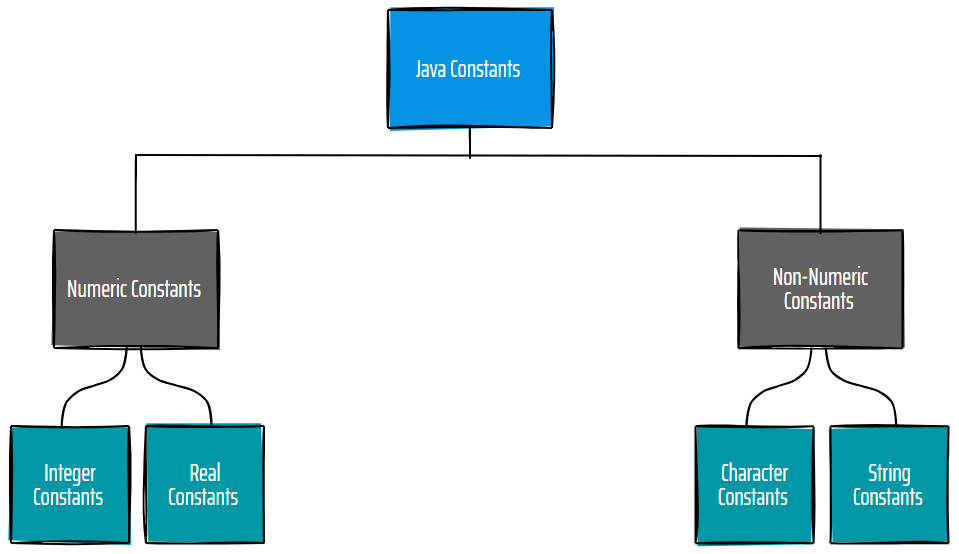Constants in Java are unchanging values that remain fixed throughout the execution of a program. They play an important role in programming by providing stability and enhancing code readability.
In this Java tutorial discussion, we will discuss the significance of constants in Java, their types, and how they contribute to writing robust and maintainable code.
What is a Constant in Java?
A constant in Java is a variable declared with the final keyword, indicating that its value cannot be changed after it is assigned. Constants are used to store values that should remain unchanged throughout the execution of a Java program.
Constants are used for storing fixed values like mathematical constants (e.g., Pi), configuration settings, or other unchanging data needed in various parts of the code. Declaring a value as a constant enhances code readability, ensures data consistency, and helps prevent accidental modifications, contributing to robust and maintainable Java programs.
Types of Constants in Java
Java Programming language supports various constants in Java; if we categorize them, they are as follows.

How to Declare Constants in Java?
To declare a constant in Java, use the final keyword followed by the data type and the constant name. As per the Java naming convention, when you declare a constant, the identifier’s name should be in capital letters.
Syntax:
final dataType CONSTANT_NAME = value;
Let’s break down this declaration:
- Final: The final keyword indicates that the variable is a constant, and its value cannot be changed once assigned.
- dataType: This specifies the data in the constant, such as int, double, String, etc., depending on the value you want to store in the constant.
- CONSTANT_NAME: This is the name you give to your constant. It should be written in uppercase letters with underscores to separate words for readability.
- Value: This is the initial value you assign to the constant.
Here are a few examples of how you can declare constants in Java:
final int MAX_VALUE = 100; final double PI = 3.14159; final String GREETING = "Hello, World!";
Define Constants In Java With Examples
Here are the following ways we can declare the constant value in Java:
Final Variables: Final variables are declared using the final keyword. Once a final variable is assigned a value, it cannot be changed.
final int MAX_ATTEMPTS = 3;
Static Final Variables: Static final variables are declared using the final keyword and are associated with a class rather than an instance of the class. They can be accessed using the class name.
public class MathConstants {
public static final double PI = 3.14159265359;
}
Enums: Enums allow you to define a set of named constant values. They are particularly useful when you have a fixed set of related constants.
public enum Day {
SUNDAY, MONDAY, TUESDAY, WEDNESDAY, THURSDAY, FRIDAY, SATURDAY
}
String Literals: String literals, enclosed in double quotes, can also be considered constants in Java.
String appName = "MyApp";
Numeric Literals: Numeric literals, such as integers and floating-point numbers, can be constants.
int numberOfDays = 7; double gravityAcceleration = 9.81;
Character Literals: Character literals are single characters enclosed in single quotes.
char firstLetter = 'A';
Boolean Literals: Boolean literals represent the values true or false.
boolean isJavaFun = true;
Null Literal: The null literal represents the absence of a value or a reference to no object.
String myString = null;
These different types of constants serve various purposes in Java programming. They enhance code readability, promote code maintainability, and help ensure that critical values remain constant throughout the execution of a program. Depending on the specific use case, you can choose the appropriate type of constant for your Java Program.
Advantages Of Java Constants
Constants offer several advantages in Java programming; here are some of them:
- Readability: Constants make your code more readable by giving meaningful names to values that are not meant to change. For example, instead of using the literal value 3.14159 for Pi in multiple places in your code, you can declare it as a constant final double PI = 3.14159, making your code self-explanatory.
- Maintainability: Using constants ensures that critical values remain consistent across your program. If you need to change such a value, you must only modify it in one place, the constant declaration, rather than hunting through your code to find every occurrence of that value.
- Preventing Errors: Constants help prevent accidental modifications of important values. Without constants, a programmer might inadvertently change a value that should remain fixed, leading to unexpected behavior.
- Performance: The Java compiler may optimize the use of constants, potentially leading to improved performance in some cases.
Conclusion:
Constants in Java are a fundamental element of robust and maintainable code. They enhance code readability, prevent unintended changes, and promote code reuse. By using final variables, static final variables, and enums appropriately, you can write Java programs that are error-free and easy to understand and maintain.
We invite you to comment if you have any doubts regarding constants in Java or would like to share suggestions for improving this article. Your feedback is valuable in enhancing our understanding of this important topic.
